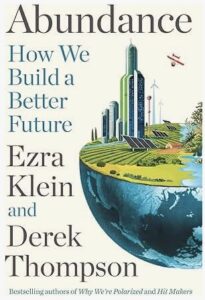En vacance…

In France, in the days of The International Herald Tribune (of blessed memory).
Quote of the Day
”At the end of the day, real wealth isn’t about flashing cash. It’s about moving through the world with an invisible safety net most people don’t even realize they’re missing.”
- Ashley Fike in Vice
Musical alternative to the morning’s radio news
Ernest Chausson | Pièce Op. 39 (1897) | Anssi Karttunen (Cello), David Lively (Piano)
New to me, but I was struck by its peacefulness. And I love the cello.
Long Read of the Day
AIxDemocracy: What are the politics of AI?
Wise and thoughtful lecture by Ethan Zuckerman. In a way, it’s really a helpful introduction to a MUCH longer piece by Arvind Narayanan & Sayash Kapoor (which is almost too long even for this section of the blog). But even if you don’t follow that link you’ll get a lot from Zuckerman’s piece. Sample:
Let’s posit for a moment that the next age is unfolding, the age of AI. What might we expect a public sphere transformed by AI to mean for democracy?
I’m going to constrain that question by embracing some language proposed by Arvind Narayanan and Sayash Kapoor at Princeton, the authors of an excellent book called AI Snake Oil. Their book is not nearly as hostile towards AI as the title might suggest – it’s helpful in understanding why some areas of AI, like image generation, are developing so quickly, and others are making little if any progress, like prediction of uncommon events. Arvind and Sayash released a paper last week called “AI as Normal Technology”, which is simultaneously a description of how AI is now, a prediction of how it will evolve in the near future and a proposal for how to regulate and live with it.
Their core idea is that while AI may be important and transformative – they offer comparisons to electricity and the Internet as similarly transformative general technologies – it’s not magic. They dismiss both the scenarios where artificial general intelligence makes most human jobs obsolete and necessitates universal basic income and the scenario where superintelligent AIs unleash killer robots to exterminate the planet’s population as unlikely and worthy of less consideration than a scenario where AI is important, but ultimately just another technology.
What does the future of AI and democracy look like if you take scenarios that are fun to think about, but unlikely to happen, off the table?
Great piece. Worth your time.
So many books, so little time
Abundance” is a book for an alternate timeline
Ezra Klein is an interesting commentator on what’s going on in the world, and he’s now co-authored a new book with Derek Thompson.

Screenshot
It’s on my to-read list, but so are many other titles at the moment and life is short, so I thought I’d read some of the reviews and then decide whether to move it up the list or not.
This review essay by Dave Karpf has caused me to press the ‘pause’ button. It’s thoughtful, fair and well-informed. But…
There is a jarring, stray passage in chapter 4 of Ezra Klein and Derek Thompson’s new book, Abundance:
Today NIH, along with NSF, are irreplaceable. If these institutions had never been created or expanded, the lives of millions, even billions of people around the world would be shorter than they are today, and people would be sicker. If they disappeared tomorrow, the world would instantly be worse.
But it is precisely because the NIH stands above every bioscience institution in significance that we should scrutinize the way it shapes the practice of science in America and around the world. (page 152)
Abundance is a good book. It has its flaws. All books do. But its most glaring weakness is not the fault of the authors: It is not a timely book.
As recently as a few months ago, NIH and NSF were indeed irreplaceable. But here, now, they are effectively being bulldozed and scrapped. It was timely and worthwhile last fall to wonder about the ways these massive institutions shape the course of scientific discovery. Today the call-to-action is to rescue whatever datasets we can. The Library of Alexandria is being burned. Salvage what you can…
My commonplace booklet
BlueSky thinking…
I’ve been on Bluesky for a few months, largely because I abhor Musk’s megaphone. In practice, you get what it promises on the tin — a feed produced by people you follow rather than a farrago that’s algorithmically curated to increase the profits of the platform you’re on.
And it’s fine — but it’s still an attention-sink. Ethically, it’s properly social-media rather than the anti-social media of X, Threads, Instagram, et al. But life is short and I hate scrolling. Result: I now look in on my feed only now and then. And I still can’t understand how so many people appear to be on it all the time: how do they get any work done?
This Blog is also available as an email three days a week. If you think that might suit you better, why not subscribe? One email on Mondays, Wednesdays and Fridays delivered to your inbox at 5am UK time. It’s free, and you can always unsubscribe if you conclude your inbox is full enough already!
